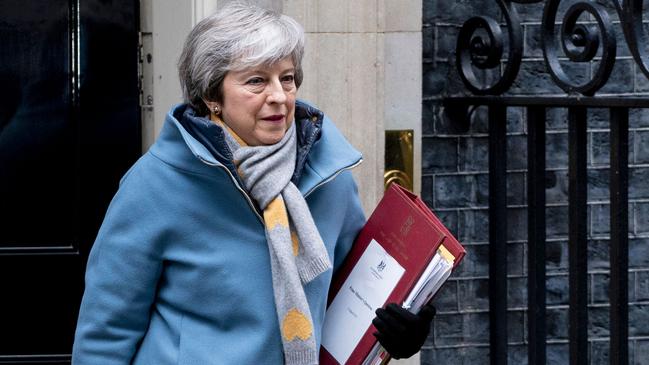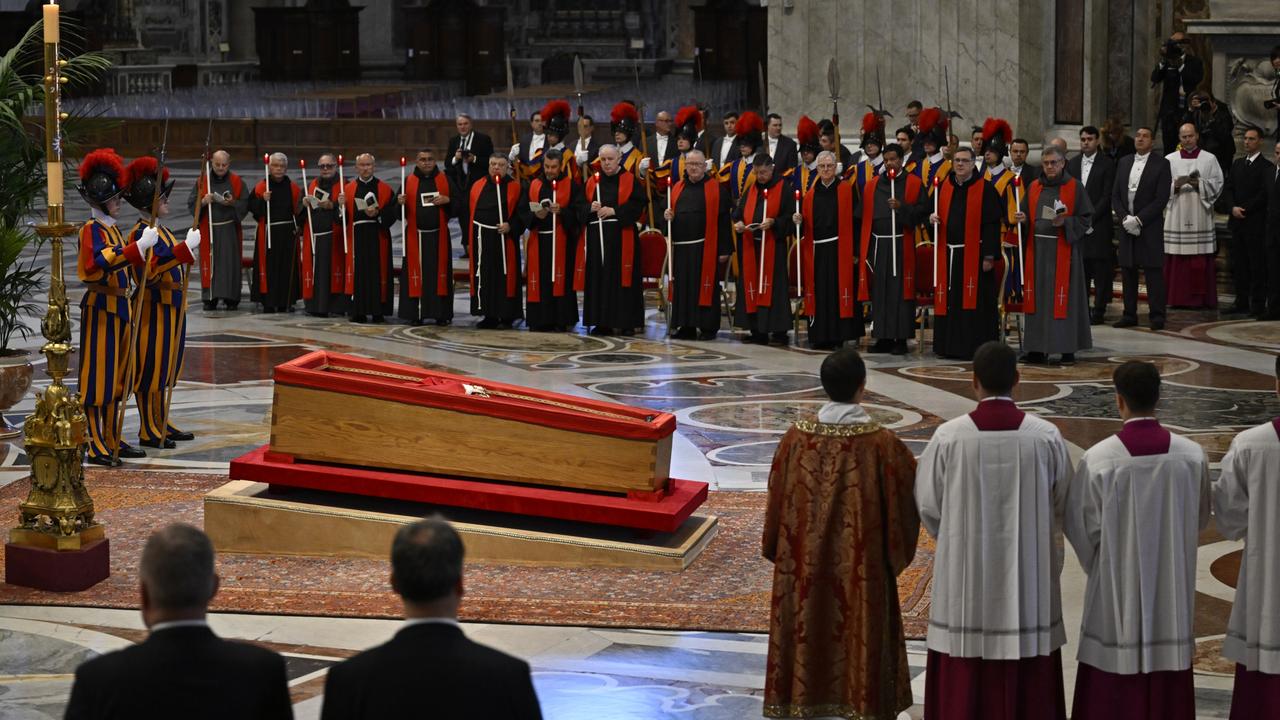May lays down law as Tories fracture over Brexit detail
A dispirited and angry Theresa May has issued an ultimatum: agree to her withdrawal bill next week or face delaying Brexit for years.

A dispirited and angry Theresa May has issued an ultimatum: agree to her withdrawal bill next week or face delaying Brexit for years.
Mrs May has indicated she will hold a third vote on the contentious bill before Wednesday, despite it being heavily defeated twice, as Brexiteers finally realise Brexit may not happen at all.
But the Prime Minister’s control of both events and her party is tenuous at best, with four of her cabinet ministers abstaining from a chaotic vote yesterday in which an amendment to rule out a no-deal Brexit passed by four votes. Amber Rudd, David Mundell, David Gauke and Greg Clark now face calls from backbenchers to be sacked.
Tory MP Mark Francois said: “The collective responsibility has disintegrated — you might as well tell the whips to pack up and go home. The government is barely in office.”
Then, when it was voted upon again, 17 Tory MPs crossed the floor. One junior minister, Sarah Newton, resigned on the spot to cross the floor.
Overnight there was expected to be a series of further amendments to the government’s motion calling for a short technical extension of article 50 (the Brexit withdrawal process) if Mrs May’s deal is agreed before next Wednesday.
As it stands, the Prime Minister’s motion calls for a short extension of article 50 if the British parliament passes the withdrawal bill before Wednesday.
It then says that if the bill is not passed then the European Council would highly likely require a clear purpose for any extension.
Any request for a delay would still have to go before EU leaders at a summit in Brussels next Thursday and Friday.
They have already stated that they will only agree to push back the Brexit date if Britain makes concrete proposals to break the crisis.
Unless British MPs agree to the deal or EU leaders unanimously approve a delay, Britain would still have to crash out of the EU with no deal in place on March 29.
The EU has also been reluctant to have any extension that would interrupt its European parliament elections from May 23-26.
Notwithstanding the need for EU agreement for a long extension, backbenchers were seeking to take control of the Brexit future with amendments to Mrs May’s extension of article 50, including calling for a second referendum.
Speaker of the house John Bercow, a Remainer, has a crucial role to play in selecting which amendments to put. He could also refuse to allow Mrs May to put her withdrawal bill to a third vote next week, something that he hinted at yesterday.
The house was in uproar after Remainers took control of the votes yesterday and abandoned Mrs May, voting 321 to 278 in the main vote to rule out no-deal unilaterally. While the vote is not legally binding, the numbers suggest that parliament could easily pass legislation making it so.
The default position is that Britain will leave the EU on March 29 unless there is a deal, an extension to article 50 or Brexit is revoked.
Scottish Nationalist leader Ian Blackford said there was now a sense of relief that the Prime Minister’s plan to put a time limit on the no-deal motion had been defeated and called for urgent legislation so “we cannot fall out of the EU’’.
“This has changed everything, extend article 50 for an unlimited period to examine options of the people’s vote, or we can revoke article 50 as well,’’ he said.
While the Tory party is in shambles, Mrs May is holding urgent talks with her confidence and supply partners, the Democratic Unionist Party and the Brexiteers, to swing behind her bill for a third vote.
The Brexiteers were disheartened when one of their preferred modes of Brexit — the Malthouse compromise of negotiating a trade deal with Brussels during an extended transition period — was heavily defeated by a margin of 210 during yesterday’s vote.
It’s believed a legal loophole referred to by Brexiteer Jacob Rees Mogg about article 62 of the Vienna convention just before the second withdrawal bill vote on Wednesday may provide the Attorney-General, Geoffrey Cox, with a way to amend his legal advice to bring on board the DUP and Brexiteers.
Mr Cox has previously said the legal instruments agreed to by the EU had not changed the legal risk of being trapped in EU control if the Irish backstop was implemented. But if he offers fresh advice it could be a way for those so stridently against the withdrawal bill to suddenly support it.
Tory MP and Brexiteer Simon Clarke said the limited range of options meant “now it’s effectively a bad Brexit deal or no Brexit at all, which is absolutely ghastly”.
Treasury chief Philip Hammond said he was “confident that we will do a deal” in the next few weeks.
The protests outside parliament after the vote highlighted the contradictory positions over the Brexit deal, with pro-Europeans and Eurosceptics rejoicing its defeat.
“It’s one step closer to stay in the EU,” said Nina Hawl, an 82-year-old Remainer.
“We won’t be so restricted outside the EU,” said Julie Astell, 58.
But it was not clear that either had won, noted Steve Peers, a professor of law at the University of Essex. “It remains to be seen if there are enough votes in parliament for another referendum” or to reverse Brexit, he said. “So far it doesn’t seem that there are.”
Additional reporting: AFP




To join the conversation, please log in. Don't have an account? Register
Join the conversation, you are commenting as Logout